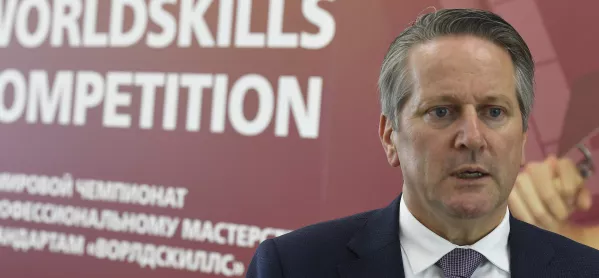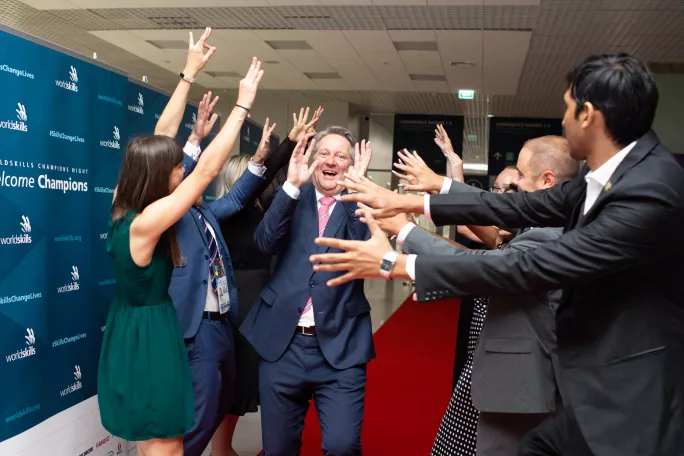- Home
- ‘The continued growth of WorldSkills isn’t sustainable’
‘The continued growth of WorldSkills isn’t sustainable’

Continuous growth of the WorldSkills competitions is not sustainable, says incoming president Jos de Goey.
Speaking to Tes from Kazan, where the 45th skills competition ended last night, Mr de Goey said that while growth of the WorldSkills movement was good from one point of view, conversations must be had about where the line should be drawn.
“We’re growing and growing, and there’s a lot of attention. Look at the opening ceremony, it was broadcast throughout Russia. But it also makes you wonder, how far do we go from here? What is the next step?” he asks.
“We need to take into consideration that somewhere there needs to be a maximum of the activities and investment. Because, otherwise, the event itself won’t be sustainable in the long term.”
Background: WorldSkills could expand to 100 countries
Simon Bartley: WorldSkills boss: ‘We’ve let skills become invisible’
Opinion: Students don’t feel college prepares them for work
Mr de Goey is currently chief executive of WorldSkills Netherlands. His words indicate that he has a different approach to his predecessor Simon Bartley. In 2016, in the midst of his presidency, Mr Bartley told Tes of his ambitions to increase WorldSkills participation to 100 countries.
Some 63 countries have taken part in this year’s competition, the opening ceremony was estimated to have cost a whopping £12 million, and the huge expo centre - at which the competition is held - was built especially for this competition by Russia.
Mr de Goey looked back to 2011, when London hosted WorldSkills at the London Excel arena.
“The Excel was one kilometre long, and we were amazed at one kilometer long fully packed with competitions. Now we have one kilometre long and more,” he said. “The Kazan expo is five…times bigger than the Excel centre.”
The impact of WorldSkills
Managing growth, Mr de Goey said, was one of the key challenges he faced. Another was building the national members to be stronger than ever, and ensuring that the impact of WorldSkills goes further than the competitions.
“Look at Russia, the impact of how organising a WorldSkills competition serves that country is clear,” he added. “It can help in reforming vocational education and training, it helps in promoting vocational education and training in that country, but it doesn’t on the same level help the other national skills organisations.”
Wha is crucial, according to Mr de Goey, is the successful running of skills competitions on a national level. The UK, for example, hosts WorldSkills UK live in Birmingham every year - it is part of the selection process for teams for both EuroSkills and WorldSkills. It’s this kind of good practice that needs to be shared across all the participating countries, according to Mr de Goey.
Then, once that’s in place, things need to go even further. Skill competitions should be embedded into a vocational education across all countries. That, he said, would be the first stage to ensure that WorldSkills had a huge international influence.

The impact of WorldSkills across the world is hard to measure, and another one of Mr de Goey’s challenges is to raise the profile of the organisation internationally.
“What always sells well in media is bad news - the good motivation stories they don’t get the headlines, other than sports. I’ve heard about England’s cricket win last week and media from all the countries in the world are covering it,” he said.
And yet the UK’s WorldSkills competitors - some of whom will go on to be crowned the best in the world - make significantly fewer headlines.
Giving young people a voice
The key to raise the profile of the WorldSkills could lie with the young people themselves, said Mr de Goey.
The organisation has access to literally thousands of young people every year - and it’s starting to conduct research that gives these young people a voice. This week, for example, WorldSkills has teamed up with the Organisation for Economic Cooperation and Development, to release a report on how 18- to 24-year-olds across the country feel their school or college prepares them for work. This area of concern is just one of many that Mr de Goey said WorldSkills could deliver research on.
“It’s possible to look at how you could use skills competitions to solve all kinds of socio-economic problems. All this talk about climate change, the reach that we have to young people is enormous,” he said. “Some organisations on a global level, they don’t have that access to a big group of young people. WorldSkills has that, we can give young people a voice.”
Mr de Goey, like so many others who witness WorldSkills, appreciates the huge potential of the young people who compete.
“I’m 56, I’m one of the old guys. I hate to say it but that’s the reality. Together with my peers, we write history because we’ve experienced so many things, but young people, they are able to develop the future. We need to give them that opportunity, and the skills opportunities to develop the future, maybe more than ever,” he said.
Keep reading for just £1 per month
You've reached your limit of free articles this month. Subscribe for £1 per month for three months and get:
- Unlimited access to all Tes magazine content
- Exclusive subscriber-only stories
- Award-winning email newsletters



